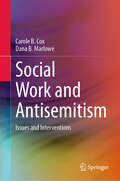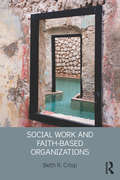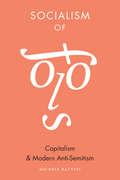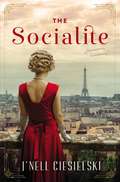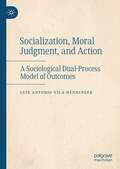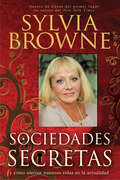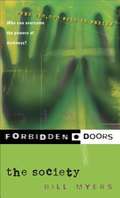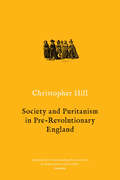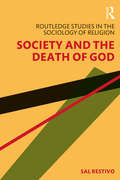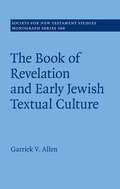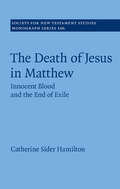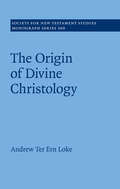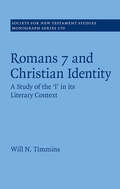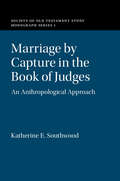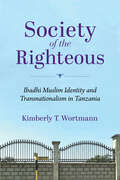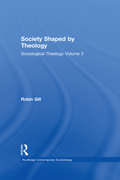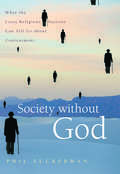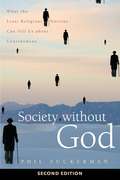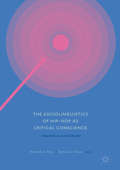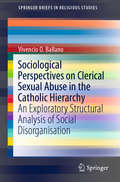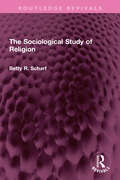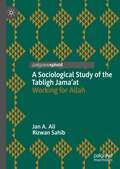- Table View
- List View
Social Work and Antisemitism: Issues and Interventions
by Carole B. Cox Dana B. MarloweThis timely book on social work and antisemitism fills an important gap in social work education and in the profession. The ethics and framework of the social work profession demand that it confronts oppression and prejudice while working for a socially just society. However, education on antisemitism is seldom included in social work curriculum or in diversity, equity, and inclusion (DEI) programs. This text addresses this need for education and intervention, and includes a teaching guide for use in social work curriculum as well as social work practice. Antisemitism, hatred and discrimination against Jewish people and Jewish institutions, is perhaps the oldest form of oppression. Throughout history, as with other oppressions, myths and stereotypes to substantiate antisemitism were developed. More recently, however, antisemitism has been increasing steadily across the globe. Combatting and dismantling it is critical for both Jewish people and institutions, the social work profession, and for society. In the book, the authors discuss antisemitism's history, the role of the Holocaust, contemporary manifestations of antisemitism, and its impact on individuals and societies. Among the topics covered are: Introduction: Human Rights, Social Justice, and Social Work Palestine, Israel, and Zionism Contemporary Antisemitism Antisemitism and Mental Health Antisemitism: A Guide for Teaching and Social Work Practice Social Work and Antisemitism: Issues and Interventions offers a foundation for combatting antisemitism and addresses the need for social work involvement. The book can be used as a primary or secondary text for courses that cover diversity, human rights, human development, ethnicity, oppression, and mental health in Bachelor- or Masters-level programs in schools of social work. In addition, the book can be used in other programs, such as DEI, or by other disciplines interested in learning about and educating about antisemitism.
Social Work and Faith-based Organizations
by Beth R. CrispFaith-based organizations continue to play a significant role in the provision of social work services in many countries but their role within the welfare state is often contested. This text explores their various roles and relationships to social work practice, includes examples from different countries and a range of religious traditions and identifies challenges and opportunities for the sector. Social Work and Faith-based Organizations discusses issues such as the relationship between faith-based organizations and the state, working with an organization’s stakeholders, ethical practice and dilemmas, and faith-based organizations as employers. It also addresses areas of debate and controversy, such as providing services within and for multi-faith communities and tensions between professional codes of ethics and religious doctrine. Accessibly written by a well-known social work educator, it is illustrated by numerous case studies from a range of countries including Australia, the UK and the US. Suitable for social work students taking community or administration courses or undertaking placements in faith-based organizations, this innovative book is also a valuable resource for managers and religious personnel who are responsible for the operation of faith-based agencies.
The Social World of Intellectuals in the Roman Empire
by Kendra Eshleman"This book examines the role of social networks in the formation of identity among sophists, philosophers, and Christians in the early Roman Empire. Membership in each category was established and evaluated socially as well as discursively. From clashes over admission to classrooms and communion to construction of the group's history, integration into the social fabric of the community served as both an index of identity and a medium through which contests over status and authority were conducted. The juxtaposition of patterns of belonging in Second Sophistic and early Christian circles reveals a shared repertoire of technologies of self-definition, authorization, and institutionalization, and shows how each group manipulated and adapted those strategies to its own needs. This approach provides a more rounded view of the Second Sophistic and places the early Christian formation of "orthodoxy" in a fresh context"--
Socialism of Fools: Capitalism and Modern Anti-Semitism
by Michele BattiniIn Socialism of Fools, Michele Battini focuses on the critical moment during the Enlightenment in which anti-Jewish stereotypes morphed into a sophisticated, modern social anti-Semitism. He recovers the potent anti-Jewish, anticapitalist propaganda that cemented the idea of a Jewish conspiracy in the European mind and connects it to the atrocities that characterized the Jewish experience in the nineteenth and twentieth centuries.Beginning in the eighteenth century, counter-Enlightenment intellectuals and intransigent Catholic writers singled out Jews for conspiring to exploit self-sustaining markets and the liberal state. These ideas spread among socialist and labor movements in the nineteenth century and intensified during the Long Depression of the 1870s. Anti-Jewish anticapitalism then migrated to the Habsburg Empire with the Christian Social Party; to Germany with the Anti-Semitic Leagues; to France with the nationalist movements; and to Italy, where Revolutionary Syndicalists made anti-Jewish anticapitalism the basis of an alliance with the nationalists. Exemplified best in the Protocols of the Elders of Zion, the infamous document that "leaked" Jewish plans to conquer the world, the Jewish-conspiracy myth inverts reality and creates a perverse relationship to historical and judicial truth. Isolating the intellectual roots of this phenomenon and its contemporary resonances, Battini shows us why, so many decades after the Holocaust, Jewish people continue to be a powerful political target.
The Socialism of Fools?
by William I. BrusteinAnti-Semitism, as it has existed historically in Europe, is generally thought of as having been a phenomenon of the political right. To the extent that nineteenth- and early twentieth-century leftist movements have been found to manifest anti-Semitism, their involvement has often been suggested to be a mere fleeting and insignificant phenomenon. As such, this study seeks to examine more fully the role that the historic European left has played in developing and espousing anti-Semitic views. The authors draw upon a range of primary and secondary sources, including the analysis of left- and right-wing newspaper reportage, to trace the relationship between the political left and anti-Semitism in France, Germany, and Great Britain from the French Revolution to World War II, ultimately concluding that the relationship between the left and anti-Semitism has been much more profound than previously believed.
The Socialite
by J'Nell CiesielskiGlamour, treachery, and espionage collide when an English socialite rushes to save her sister from the Nazis. As the daughter of Sir Alfred Whitford, Kat has a certain set of responsibilities. But chasing her wayward sister, Ellie, to Nazi-occupied Paris was never supposed to be one of them. Now accustomed to the luxurious lifestyle that her Nazi boyfriend provides, Ellie has no intention of going back to the shackled life their parents dictate for them—but Kat will stop at nothing to bring her sister home. Arrested for simply trying to defend himself against a drunken bully, Barrett Anderson is given the option of going to jail or serving out his sentence by training Resistance fighters in Paris. A bar owner serves as the perfect disguise to entertain Nazis at night while training fighters right below their jackboots during the day. Being assigned to watch over two English debutantes is the last thing he needs, but a payout from their father is too tempting to resist. Can Barrett and Kat trust each other long enough to survive, or will their hearts prove more traitorous than the dangers waiting around the corner?
Socialization, Moral Judgment, and Action: A Sociological Dual-Process Model of Outcomes
by Luis Antonio Vila-HenningerHow does culture affect action? This question has long been framed in terms of a means vs ends debate—in other words, do cultural ends or cultural means play a primary causal role in human behavior? However, the role of socialization has been largely overlooked in this debate. In this book, Vila-Henninger develops a model of how culture affects action called “The Sociological Dual-Process Model of Outcomes” that incorporates socialization. This book contributes to the debate by first providing a critical overview of the literature that explains the limitations of the sociological dual-process model and subsequent scholarship—and especially work in sociology on “schemas”. It then develops a sociological dual-process model of moral judgment that formally explains Type I processes, Type II processes, and the interaction between Type I and Type II processes. The book also expands sociological dual-process models to include a temporal dimension—the "Sociological Dual-Process Model of Outcomes". Finally, the book integrates a theory of socialization into the sociological dual-process model and creates empirical indicators that confirm Vila-Henninger’s theorization and contribute to the literature on measures of dual-process models.
Sociedades Secretas: Y Cómo Afectan Nuestras Vidas En La Actualidad
by Sylvia BrowneFresh from the success of her book Secrets & Mysteries of the World, Sylvia Browne now writes about the clandestine world of secret societies. Sylvia’s research, combined with her amazing communication with her spirit guide Francine, has uncovered the fact that many secret societies affect the lives of each of us every day . . . whether it be in the areas of religion, politics, economy, government, crime, or other worldwide influences. She shares her knowledge of the conspiracies, coverups, long-held secrets, misinformation, and power manipulations of secret societies in both the past and present and how they can affect us today and in the future. From the mysterious secrets of the Knights Templar to the powerful secret societies of the modern age, Sylvia takes us on an amazing journey to explore and unearth the truth. She discusses the amazing influence of the Freemasons on our Founding Fathers, the influence of religion on earth-shaking secrets and terrorism, the agenda of powerful secret societies for a "New World Order," and much more. Sylvia explores it all, and even gives us information on a powerful secret society that no one has even heard about. So lock your windows and doors and read about these societies and their secrets . . . some will really raise the hair on your neck!
The Society (Forbidden Doors, #1)
by Bill MyersOuija boards, amulets, charm pouches ... just kid's stuff, right? At least, that's what Rebecca and Scott think when they first move to Crescent Bay. Then they run into the Society-a select group of students who practice occultic rituals using these objects ... a group that decides Becka and Scott are a threat to them and their powers. Soon the brother and sister discover the hidden power behind the "games"-and the dangerous consequences for those standing in its way. Not until the final showdown, when their faith is put to the ultimate test, do Scott and Rebecca realize the awesome power and victory of God over darkness. Recommended for ages 12 and up.
Society and Puritanism in Pre-revolutionary England (Peregrine Bks.)
by Christopher HillThe role of Puritanism in the formation of modern BritainIn order to understand the English Revolution and Civil War we need to understand Puritanism. In this classic work of social history, Professor Hill shows Puritanism as a living faith, one that responded to social as well as religious needs. It was a set of beliefs that answered the hopes and fears of yeomen and gentlemen, merchants and artisans in the tribulations of early modern Britain, a time of extraordinary turbulence. Over this period, Puritanism, he shows, was interwoven into daily life. He looks at how rituals such as oath-taking, the Sabbath, bawdy courts and poor relief, became ways to order the social upheaval. He even offers an explanation for the emergence of the seemingly paradoxical - the Puritan revolutionaries.
Society and the Death of God (Routledge Studies in the Sociology of Religion)
by Sal RestivoThis book advances the "strong" programme that sociology and anthropology provide a scientific foundation for arguing that God and the gods are human creations. Contending that religion is one – but not the only – way to systematize and institutionalize the moral order of a society, the author argues that religion reflects the fundamental human need for belonging and the social function of compassion. As such, our transcendental and supernatural ideas are really concerned with our everyday lives in communities and, faced with the severity and immediacy of the global problems with which the world is confronted – existential threats – it is increasingly important to abandon delusions and correct our mistake in reference, not by eradicating religion, but by grounding it more explicitly in earthly matters of community, social solidarity, belonging, and compassion. A wide-ranging study of the roots, nature, and purpose of religion and theistic belief, Society and the Death of God will appeal to sociologists, social theorists, and philosophers with interests in the scientific study of religion and the role of religion in the life of humankind.
Society for New Testament Studies: The Book of Revelation and Early Jewish Textual Culture (Society for New Testament Studies Monograph Series #168)
by Allen Garrick V.The Book of Revelation and Early Jewish Textual Culture explores the relationship between the writing of Revelation and its early audience, especially its interaction with Jewish Scripture. It touches on several areas of scholarly inquiry in biblical studies, including modes of literary production, the use of allusions, practices of exegesis, and early engagements with the Book of Revelation. Garrick Allen brings the Book of Revelation into the broader context of early Jewish literature, including the Dead Sea Scrolls and other important works. Arguing that the author of the New Testament Apocalypse was a 'scribal expert, someone who was well-versed in the content of Jewish Scripture and its interpretation', he demonstrates that John was not only a seer and prophet, but also an erudite reader of scripture.
Society for New Testament Studies: Innocent Blood and the End of Exile (Society for New Testament Studies Monograph Series #167)
by Hamilton Catherine SiderIn this book, Catherine Sider Hamilton introduces a new lens through which to view the death of Jesus in Matthew. Using the concept of 'innocent blood', she situates the death of Jesus within a paradigm of purity and pollution, one that was central in the Hebrew Scriptures and early Judaism from the Second Temple to the rabbis. Hamilton traces the theme of innocent blood in Matthew's narrative in relation to two Jewish traditions of interpretation, one (in Second Temple literature) reflecting on the story of Cain and Abel; the other (chiefly in rabbinic literature) on the blood of Zechariah. 'Innocent blood' yields a vision that resists the dichotomies (intra muros vs extra muros, rejection vs redemption) that have characterized the debate, a vision in which both judgment and redemption - an end of exile - may be true. 'Innocent blood' offers a new approach not only to the meaning of Jesus' death in Matthew but also to the vexed question of the Gospel's attitude toward contemporary Judaism.
Society for New Testament Studies: Jesus and the Temple
by Simon J. JosephMost Jesus specialists agree that the Temple incident led directly to Jesus' arrest, but the precise relationship between Jesus and the Temple's administration remains unclear. Jesus and the Temple examines this relationship, exploring the reinterpretation of Torah observance and traditional Temple practices that are widely considered central components of the early Jesus movement. Challenging a growing tendency in contemporary scholarship to assume that the earliest Christians had an almost uniformly positive view of the Temple's sacrificial system, Simon J. Joseph addresses the ambiguous, inconsistent, and contradictory views on sacrifice and the Temple in the New Testament. This volume fills a significant gap in the literature on sacrifice in Jewish Christianity. It introduces a new hypothesis positing Jesus' enactment of a program of radically nonviolent eschatological restoration, an orientation that produced Jesus' conflicts with his contemporaries and inspired the first attributions of sacrificial language to his death.
SOCIETY FOR NEW TESTAMENT STUDIES: The Origin of Divine Christology (Society for New Testament Studies Monograph Series #169)
by Loke Andrew Ter ErnIn recent years, there has been considerable debate concerning the origin of divine Christology. Nevertheless, the proposed theories are beset with problems, such as failing to address the evidence of widespread agreement among the earliest Christians concerning divine Christology, and the issues related to whether Jesus' intention was falsified. This book offers a new contribution by addressing these issues using transdisciplinary tools. It proposes that the earliest Christians regarded Jesus as divine because a sizeable group of them perceived that Jesus claimed and showed himself to be divine, and thought that God vindicated this claim by raising Jesus from the dead. It also provides a comprehensive critique of alternative proposals, and synthesizes their strengths. It defends the appropriateness and merits of utilizing philosophical distinctions (e. g. between ontology and function) and Trinitarian concepts for explaining early Christology, and incorporates comparative religion by examining cases of deification in other contexts.
Society for New Testament Studies: A Study of the ‘I' in its Literary Context (Society for New Testament Studies Monograph Series #170)
by Will N. TimminsIn this book, Will N. Timmins provides a close rereading of Romans 7 within its literary-argumentative context and offers a fresh and compelling solution to the identity of the 'I' in this text. Challenging existing paradigms, which fail to provide both literary coherence and theological plausibility, he develops his own positive theory about the device. Along the way he also re-examines a number of key texts within the letter, which have hitherto not been given due weight within the scholarly discussion. This study offers a fresh and satisfying solution to one of the Bible's most notorious cruxes, and contributes to our understanding of the apostle Paul's thought. It will be of interest to all scholars and students within the fields of biblical studies and Christian theology.
Society for Old Testament Study: Marriage by Capture in the Book of Judges
by Southwood Katherine E.In this book, Katherine E. Southwood offers a new approach to interpreting Judges 21. Breaking away from traditional interpretations of kingship, feminism, or comparisons with Greek or Roman mythology, she explores the concepts of marriage, ethnicity, rape, and power as means of ethnic preservation and exclusion. She also exposes the many reasons why marriage by capture occurred during the post-exilic period. Judges 21 served as a warning against compromise- submission to superficial unity between the Israelites and the Benjaminites. Any such unity would result in drastic changes in the character, culture, and values of the ethnic group 'Israel'. The chapter encouraged post-exilic audiences to socially construct those categorised as 'Benjaminites' as foreigners who do not belong within the group, thereby silencing doubts about the merits of unity.
Society of the Righteous: Ibadhi Muslim Identity and Transnationalism in Tanzania (Framing the Global)
by Kimberly T. WortmannAlthough the rule of the Omani sultanate in Tanzania came to an end following the Zanzibar Revolution in 1964, the legacy of its empire still exists today, along with its distinctive religious identity. The Ibadhi Muslims of Omani descent, who are neither Sunni nor Shi'a, have used a message of tolerance and harmonious coexistence to spread their beliefs across North and East Africa in a post-revolution and post-independence era.In Society of the Righteous, Kimberly T. Wortmann explores how the Ibadhi-Omani community in Tanzania has engaged in charitable activities, cooperation within the Muslim community, and economic development, despite facing suspicions of foreign influence and elitism. The focus is on the Istiqaama Muslim Community, an international charity network established in Oman and Tanzania in 1995. This ethnographic and transregional study documents the strategies employed by the "People of Truth and Righteousness" to preserve their unique religious practices and beliefs.Society of the Righteous moves beyond the typical discussions on global Muslim religion and politics, such as tradition versus modernity, conflicts between different branches of Islam, and the global war on terror. Instead, it explores the intricacies of a religious community whose significance has been obscured by the limitations of area studies paradigms. It illuminates the complexities of religious identity, transnational networks, gender relations, and the power of collective memory in shaping narratives of belonging, cultural preservation, and change in an increasingly interconnected world.
Society Shaped by Theology: Sociological Theology Volume 3 (Routledge Contemporary Ecclesiology)
by Robin GillOver the last thirty years a number of theologians have been using aspects of sociology alongside the more traditional resources of philosophy. In turn, sociologists with an interest in theology have also contributed to an interaction between theology and sociology. The time is right to revisit the dialogue between theologians and sociologists. In his new trilogy on Sociological Theology, Robin Gill makes a renewed contribution to the mapping of three abiding ways of relating theology and sociology, with the three volumes covering: Theology in a Social Context; Theology Shaped by Society; Society Shaped by Theology. Society Shaped by Theology explores the possibility that theological concepts may sometimes still be influential in the modern world. It follows in the tradition of Max Weber, arguing that theological virtues and debates can at times be transposed, wittingly or unwittingly, into society at large. Robin Gill examines the unusual instance of the public debate about Honest to God in the 1960s, but then turns to the current debate about faith and social capital, adding fresh and unexpected evidence. Finally Gill argues that bioethics in the public domain, especially on global issues such as AIDS, can be enriched and deepened by a judicious use of theological virtues.
Society without God
by Phil Zuckerman"Silver" Winner of the 2008 Foreword Magazine Book of the Year Award, Religion CategoryBefore he began his recent travels, it seemed to Phil Zuckerman as if humans all over the globe were "getting religion"--praising deities, performing holy rites, and soberly defending the world from sin. But most residents of Denmark and Sweden, he found, don't worship any god at all, don't pray, and don't give much credence to religious dogma of any kind. Instead of being bastions of sin and corruption, however, as the Christian Right has suggested a godless society would be, these countries are filled with residents who score at the very top of the "happiness index" and enjoy their healthy societies, which boast some of the lowest rates of violent crime in the world (along with some of the lowest levels of corruption), excellent educational systems, strong economies, well-supported arts, free health care, egalitarian social policies, outstanding bike paths, and great beer.Zuckerman formally interviewed nearly 150 Danes and Swedes of all ages and educational backgrounds over the course of fourteen months. He was particularly interested in the worldviews of people who live their lives without religious orientation. How do they think about and cope with death? Are they worried about an afterlife? What he found is that nearly all of his interviewees live their lives without much fear of the Grim Reaper or worries about the hereafter. This led him to wonder how and why it is that certain societies are non-religious in a world that seems to be marked by increasing religiosity. Drawing on prominent sociological theories and his own extensive research, Zuckerman ventures some interesting answers.This fascinating approach directly counters the claims of outspoken, conservative American Christians who argue that a society without God would be hell on earth. It is crucial, Zuckerman believes, for Americans to know that "society without God is not only possible, but it can be quite civil and pleasant."
Society without God, Second Edition: What the Least Religious Nations Can Tell Us about Contentment
by Phil ZuckermanAn updated edition showcasing the social health of the least religious nations in the worldReligious conservatives around the world often claim that a society without a strong foundation of faith would necessarily be an immoral one, bereft of ethics, values, and meaning. Indeed, the Christian Right in the United States has argued that a society without God would be hell on earth.In Society without God, Second Edition sociologist Phil Zuckerman challenges these claims. Drawing on fieldwork and interviews with more than 150 citizens of Denmark and Sweden, among the least religious countries in the world, he shows that, far from being inhumane, crime-infested, and dysfunctional, highly secular societies are healthier, safer, greener, less violent, and more democratic and egalitarian than highly religious ones.Society without God provides a rich portrait of life in a secular society, exploring how a culture without faith copes with death, grapples with the meaning of life, and remains content through everyday ups and downs. This updated edition incorporates new data from recent studies, updated statistics, and a revised Introduction, as well as framing around the now more highly developed field of secular studies. It addresses the dramatic surge of irreligion in the United States and the rise of the “nones,” and adds data on societal health in specific US states, along with fascinating context regarding which are the most religious and which the most secular.
The Sociolinguistics of Hip-hop as Critical Conscience: Dissatisfaction and Dissent
by Damian J. Rivers Andrew S. RossThis book adopts a sociolinguistic perspective to trace the origins and enduring significance of hip-hop as a global tool of resistance to oppression. The contributors, who represent a range of international perspectives, analyse how hip-hop is employed to express dissatisfaction and dissent relating to such issues as immigration, racism, stereotypes and post-colonialism. Utilising a range of methodological approaches, they shed light on diverse hip-hop cultures and practices around the world, highlighting issues of relevance in the different countries from which their research originates. Together, the authors expand on current global understandings of hip-hop, language and culture, and underline its immense power as a form of popular culture through which the disenfranchised and oppressed can gain and maintain a voice. This thought-provoking edited collection is a must-read for scholars and students of linguistics, race studies and political activism, and for anyone with an interest in hip-hop.
Sociological Perspectives on Clerical Sexual Abuse in the Catholic Hierarchy: An Exploratory Structural Analysis of Social Disorganisation (SpringerBriefs in Religious Studies)
by Vivencio O. BallanoThis book, as an exploratory sociological analysis, broadly examines the major structural factors which contribute to the social disorganization of the Catholic hierarchy as a clerical community, facilitating the persistence of clerical sexual abuse in the Catholic Church. Using some tenets of the social disorganization theory on crime and deviance as the overall theoretical framework with some perspectives from social organization, social network, and social capital, and secondary literature and qualitative data to support the arguments, it examines the (1) diocesan clergy’s social interaction, mutual support, and social control system in the hierarchical community, (2) connection between mandated clerical celibacy and clerical sexual abuse, and (3) the implication of the laity’s lack of empowerment and ecclesiastical authority to monitor and sanction clerical behavior. The Catholic hierarchy prides itself as a unified community of clerics under the Pope who shares the one priesthood of Christ. But the current clerical sexual scandals and the inability of bishops to adequately manage clerical sexual abuse cases make one wonders whether the Catholic clergy is indeed a cohesive and socially organized community which inhibits clerical sexual abuse. This book invites Church authorities, theologians, scholars, and lay leaders to understand the persistent clerical sexual abuse empirically and to come up with structural reforms which enhance the social network and social control systems of the Catholic hierarchy against clerical sexual misconduct and support victims.
The Sociological Study of Religion (Routledge Revivals)
by Betty R. ScharfFirst published in 1970, The Sociological Study of Religion distinguishes the sociological from the philosophical or theological approach to religion. It reviews the major theories relating to religious practice to social structure and analyzes the social functions of religion. The contributions of Durkheim, Marx, Freud, Troeltsch and Weber are examined from this point of view, also the contribution of social anthropology, and the studies of religion in industrial societies. This book is a must read for students of sociology and religion.
A Sociological Study of the Tabligh Jama’at: Working for Allah
by Jan A. Ali Rizwan SahibIn this book we study The Tabligh Jama’at, an Islamic revivalist movement which, through participation in its preaching tours, provides satisfaction to individuals experiencing the crisis of modernity. Preaching tours enable Muslims to become workers for Allah and involved in the renewal of Allah’s world. We explore the ideological underpinning of preaching and working for Allah through the application of Frame Theory. Through an analytic framework comprising framing tasks and framing processes we unpack how the ideas of Islamic revivalism found in key Tabligh Jama’at written and oral texts – the Faza’il-e-A’maal and bayans – are packaged and communicated in such a way as to attract individuals to participate in preaching tours. The book concludes that working for Allah provides Muslims with meaning, social solidarity, and satisfaction which modernity has failed to provide them. This book will appeal to academics, researchers, journalists, policy-makers, and research students interested in or working on Islamic revivalist movements.
